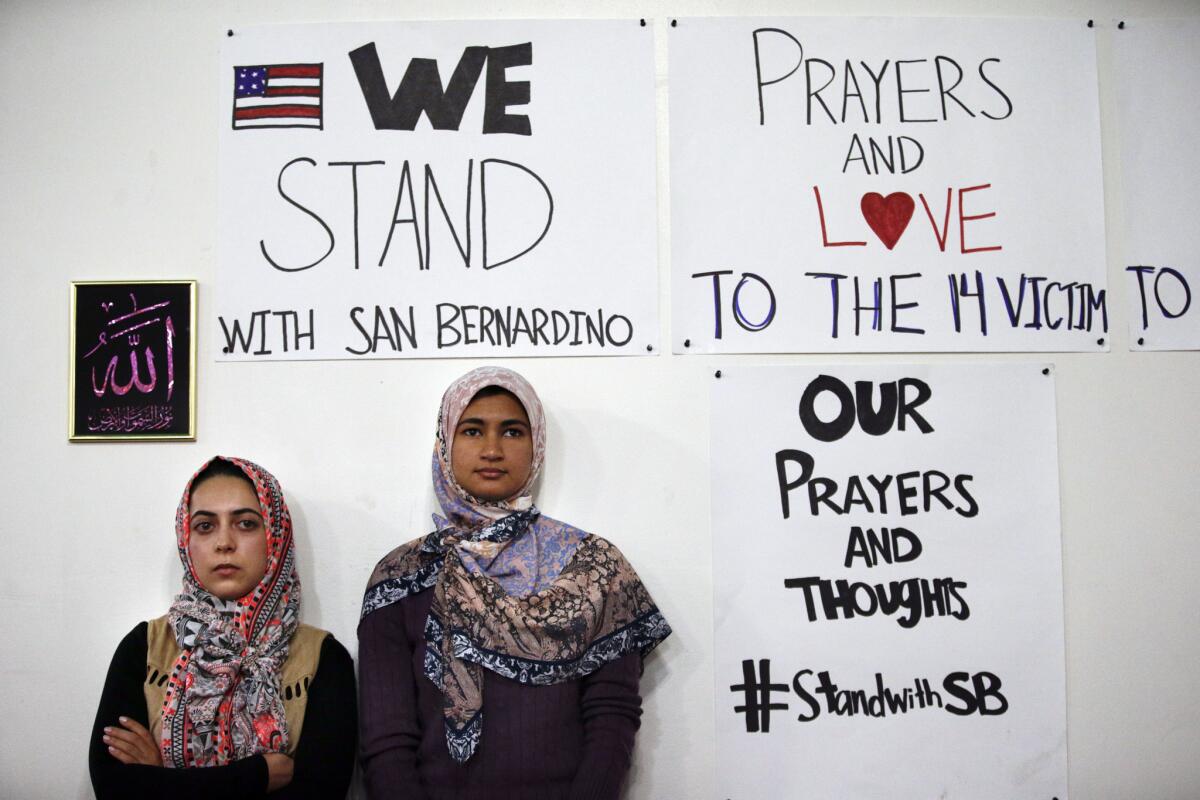What it’s like to be a Muslim woman after a terrorist attack

Khadija Zadeh, left, and Noora Siddiqui stand next to signs while listening to a speech during an interfaith memorial service at the Islamic Community Center of Redlands, Sunday, Dec. 6, 2015, in Loma Linda, Calif. The memorial service was held to honor the victims of Wednesday’s shooting rampage that killed 14 people in San Bernardino, Calif. (AP Photo/Jae C. Hong)
- Share via
“God, please don’t let them be Muslim.”
Tina Aoun said those words to herself last week as she sat in the lounge of UC Riverside’s Middle Eastern Student Center, which she directs. Together, she and several students watched footage of a still-unfolding search for any details on the shooters that killed 14 people Wednesday in nearby San Bernardino.
In the immediate aftermath of the Nov. 13 attacks in Paris, the center fielded complaints from Muslim students who reported being harassed – such as one being called a “rag-head.”
FULL COVERAGE: San Bernardino shooting | Live updates
So when it was reported that one of the shooters, Syed Rizwan Farook, had previously attended a mosque down the street from the campus, students feared more of the same.
The next day, two male students were walking downtown when someone shouted “ISIS” at them. They did nothing to provoke the harassment, she said, other than wearing beards.
Aoun said she is especially concerned for the safety of Muslim women.
Women who wear head coverings such as a hijab, she said, are easily distinguished as Muslims. That makes them more vulnerable to verbal or physical harassment.
Two weeks before the shooting, San Diego State campus police reported that a white man grabbed a woman’s headscarf and made racist comments to her. At a high school in San Francisco last year, a girl said that boys had ripped off her headscarf, spit on her, and called her a “terrorist.”
Many parents of Muslim women attending local campuses have asked their children either to take off their hijab, or to wear hooded sweat shirts to hide their head coverings. Aoun said that at least 10 students came to her asking her what they should do about their parents’ requests.
“I can’t give them religious advice,” she said. “But this situation is really terrifying.”
On Friday, a candlelight vigil was held at UC Riverside for the victims of the shooting, including three school alumni who had been hurt or killed in the attacks.
After the vigil, Rafika Alami was one of several students who headed back to the Middle Eastern Student Center to meet up with friends and study for final exams.
A photo from Alami’s high school yearbook went viral last year. The combination of her wearing a hijab, along with a humorous quote, “Only reason I wear this is to give you females a chance,” made waves on social media. The comments online were positive and negative.
She’s used to verbal harassment, Alami said. “I’ve been called every name you can think of. I can take insults,” she said. “But now, I’m really afraid.”
“It’s so hard, because we need to mourn the people killed in San Bernardino, but we have to also worry about our own safety,” Alami said. “That’s the sad reality of it.”
Alami said that after 9/11, her aunt was attacked while picking up her child from kindergarten. She suffered injuries to her neck and arm that never fully healed.
Aoun, the director of the community center, said that she has suggested that women travel in pairs, even during the day, and that they carry mace.
She said that campus police recently offered to increase patrols on a path between campus and the nearby mosque, which is often used by Muslim students who attend prayer before or after classes.
“The campus police have been really helpful so far,” Aoun said, noting that an officer had stopped by the lounge to check on the students and assure them that police were available if they needed help.
Alami said that after the shootings, many of her non-Muslim friends contacted her.
Recently, she was in the bathroom when she noticed another student staring at her. Alami said the young woman was a bit nervous about approaching her, but said: “I know there’s a lot going on now,” apparently referring to comments that Alami, as a Muslim, might have heard. “Don’t listen to them, ignore them. Just be you,” the student said.
“She didn’t really know how to word it, but I could tell that she just wanted to support me in her own way,” said Alami.
“I wanted to give her the biggest hug.”
Follow me @dexdigi for more on the intersection of culture and the Internet.
MORE ON SAN BERNARDINO SHOOTING
FBI raids home of San Bernardino shooter’s friend, taking items in terrorist probe
Inquiry into San Bernardino attack looks for radicalism roots
San Bernardino assailant attended Islamic institute in Pakistan
More to Read
Sign up for Essential California
The most important California stories and recommendations in your inbox every morning.
You may occasionally receive promotional content from the Los Angeles Times.













